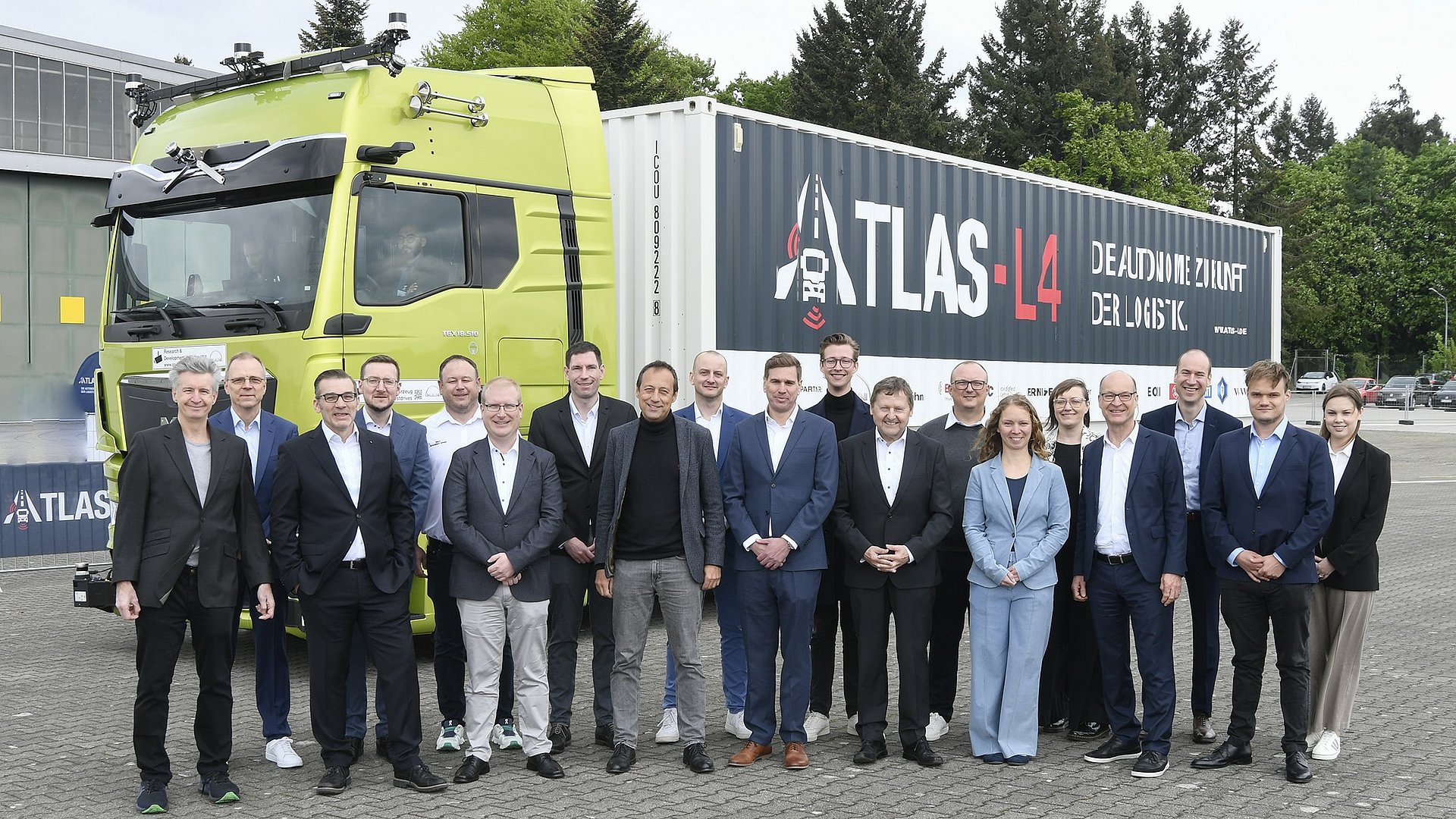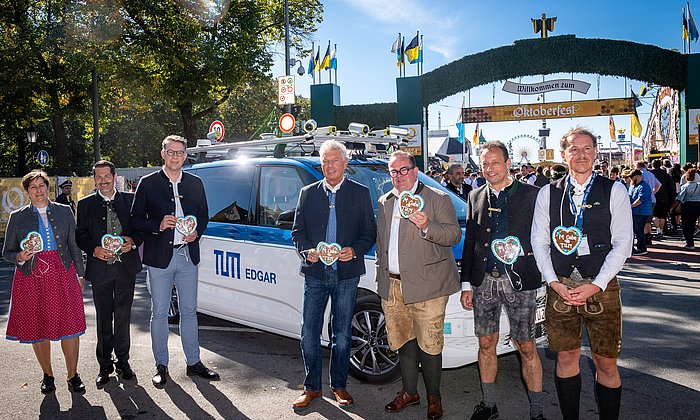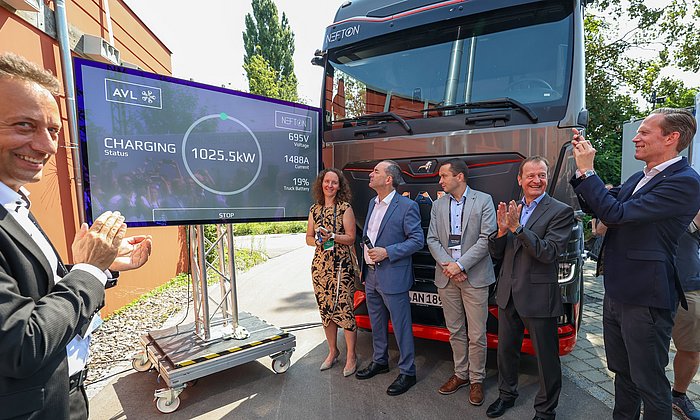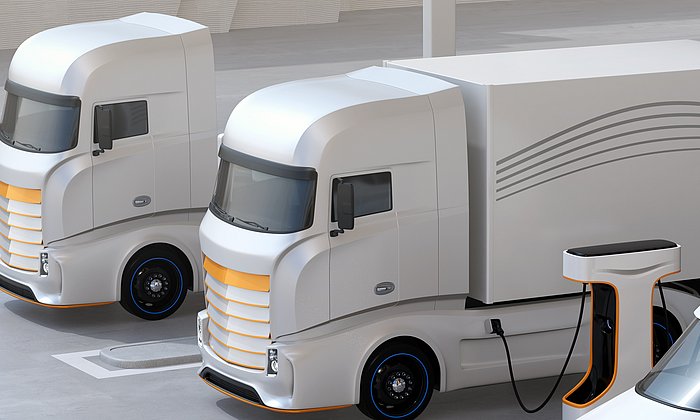ATLAS-L4 funding project draws a successful balance sheet
Goal achieved: the driverless truck on the road becomes reality

The consortium had set itself a clear goal in the project, which was funded by the Federal Ministry for Economic Affairs and Climate Protection and had a total budget of 59.1 million euros: to bring a level 4 automated and thus autonomously driving truck for hub-to-hub transport onto the motorways. The basis for this was the law passed in 2021, which basically enables autonomous driving on defined routes under technical supervision and thus puts Germany in a pioneering role globally.
“Together with our partners, we have set ourselves a high goal and realised an industrialisable basic concept for autonomous driving in hub-to-hub use. The development and integration of the redundant components required for safe use, such as steering, brakes and the vehicle electrical system, as well as the creation of a validation concept required interdisciplinary expertise and close teamwork. As a consortium, we have proven ourselves with this project: Autonomously driving trucks are feasible!” sums up Dr Frederik Zohm, Executive Board Member for Research and Development at MAN Truck & Bus, adding, “Innovations such as autonomous driving require such collaborations in order to effectively advance future technology in Germany and Europe.”
How did the trial phase go?
The starting signal for ATLAS-L4 was given on 1 January 2022. After the Federal Motor Transport Authority granted the first Level 4 test approval for a commercial vehicle manufacturer in April 2024, the premiere on public roads took place with the first motorway drive of an autonomous truck in Germany - with Federal Transport Minister Volker Wissing as a prominent companion. A safety driver was always on board for this and all other test drives. The automation software in the vehicle was continuously optimised through regular releases over a long period of time and tested directly in practice.
Mission accomplished!
The consortium was able to tick all the project objectives: The safety-relevant components for the Level 4 architecture, such as the redundant braking system, on-board network and steering system, were installed. A validation concept was drawn up and the control centre for technical supervision was put into operation at the same time. Risk analyses and safety considerations for Level 4 - including cyber security, for example in the form of authentic and encrypted communication, as well as the definition of functional safety measures such as redundancies and degradation concepts for the autonomous driving system - took place. The result: a prototype technology as a blueprint for further projects and series developments.
Developments were tested in the TUM test vehicle EDGAR
In the project, the Technical University of Munich (TUM) developed important technologies for controlling the vehicle. These include new methods for real-time control that also work in the event of uncertainties or sudden changes. Artificial intelligence helps to flexibly adapt the control system to different driving situations and to master them. The TUM research team also uses cameras and statistical models to reliably evaluate road conditions and tire friction values. New concepts have been developed for remote control, which help to steer the vehicle safely even with poor image quality. All developments were tested in the TUM test vehicle EDGAR and published as open source.
"Automation in truck traffic offers the possibility of maintaining transportation despite the ever-increasing shortage of truck drivers," says Markus Lienkamp, Professor of Automotive Engineering at TUM.
What’s next?
The work of ATLAS-L4 can therefore be used as a basic concept for future industrial developments, although various detailed questions still need to be clarified for an autonomous truck in series production, which the project has revealed. “We have done valuable pioneering work by providing practical proof of the technical feasibility of autonomous trucks,” says project coordinator Sebastian Völl, MAN Truck & Bus. “These concepts are now being incorporated into further development work for the series development of autonomous trucks.”
Logistics 4.0 offers a great deal of potential: driverless trucks as part of hub-to-hub automation for shuttle journeys between logistics centres can make an important contribution to greater efficiency and the avoidance of traffic jams and accidents. Automation concepts also offer a solution to the driver shortage that the industry has been suffering from for years. There is already a shortage of around 100,000 truck drivers in Germany.
On 7 and 8 May, the project participants presented the results of ATLAS-L4 to around 200 guests in the presence of representatives of the Federal Ministry of Economics and Climate Protection - with driving demonstrations on the grounds of the ADAC Mobility Test Centre in Penzing and on the motorway, an exhibition covering around 1,000 square metres and scientific presentations.
- Further information on the ATLAS-L4 project and the project partners and their individual project results is available online: www.atlas-l4.com
- Research on Artificial Intelligence and Mobility at TUM
Technical University of Munich
Corporate Communications Center
- Moritz Müller
- presse@tum.de
- Teamwebsite
Contacts to this article:
Prof. Dr. Markus Lienkamp
Technical University of Munich (TUM)
Institute of Automotive Technology / Munich lnstitute of Robotics and Machine lntelligence (MIRMI)
Tel. + 49 89 289 15353
lienkamp@tum.de


